SCERT AP 7th Class Social Study Material Pdf 10th Lesson State Government Textbook Questions and Answers.
AP State Syllabus 7th Class Social 10th Lesson Questions and Answers State Government
7th Class Social 10th Lesson State Government Textbook Questions and Answers
Review of Your Previous Knowledge
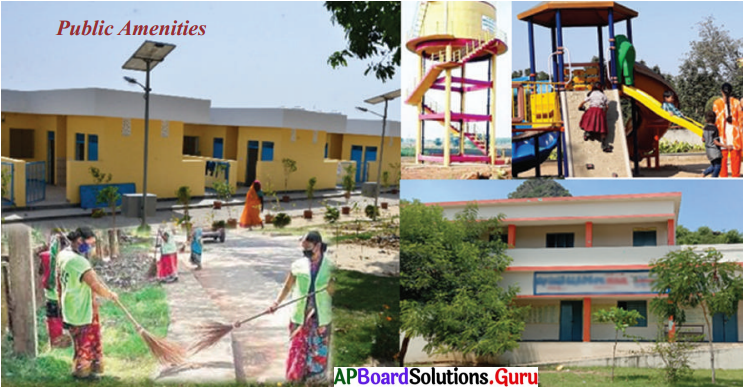
Observe the above pictures and respond to the following questions.
Question 1.
What do you observe in the picture?
Answer:
I observe the following in the above given picture :
- School
- The children are playing in the Park
- Water tank
- Roads are cleaning by municipal workers.
Question 2.
What are the public amenities observed in the picture?
Answer:
- Safe drinking water.
- Park
- Removal of Garbage from the streets.
- School.
- Street Lights.
Question 3.
Who provides the public amenities?
Answer:
Government provides the public amenities.
![]()
Question 4.
What is a Government?
Answer:
A government is an institution or a system made of a group of people that takes care or manages a country or state.
Improve Your Learning
I. Answer the following questions.
Question 1.
Differentiate between Local Government and State Government.
Answer:
| State Government | Local Government |
| The Government offices, elected officials, bureaucrats, laws and government services that exist at the state level. | The governments that cover smaller jurisdictions below the state level including village and city. |
Question 2.
What is a Constituency?
Answer:
A constituency means the body of citizens eligible to vote for a particular representative.
(OR)
A country is divided into many separate units or areas for the purpose of holding elections.
Each area in which elections are held is known as a constituency. People living in a consti-tuency elect their own representative from their constituency.
Question 3.
How can an MLA become Chief Minister? Explain.
Answer:
- After the elections, the MLAs belonging to the ruling party will elect their leader who will become the chief minister.
- A Chief Minister is an elected head of the government who is selected through a majority in the state legislative assembly established by the vote of confidence in the legislative assembly, suggested by the governor of the state who is the appointing authority.
Question 4.
Who appoints the Chief Minister and other Ministers?
Answer:
The Governor appoints Chief Minister and other Ministers.
![]()
Question 5.
If you were elected as a Member of Legislative Assembly (MLA), what would you do for your Constituency?
Answer:
If I become MLA :
- First, I will study the problems of my constituency.
- I will meat the people of my constituency and ask their problems like electricity, drainage and water facilities, etc.
- In the time of Assembly session, I will address the problems of my constituency and try to solve them.
Question 6.
What will happen if the Governor does not approve the bill?
Answer:
A bill that the state legislature has passed can become a law only after the Governor gives assent.
Sometimes the Governor can return a bill to the state legislature for reconsideration.
After reconsideration, if the state legislature sends it back to the Governor for the second time, the Governor must assent to it.
Question 7.
Name some Departments of the State Government.
Answer:
- Public works department.
- The Agriculture Department.
- The Health Department.
- The Education Department and so on.
Question 8.
Write a note on Lok Adalat.
Answer:
Lok Adalts are people’s courts.
- It is one of the alternative dispute redreslsal mechanisms.
- It is a forum where cases pending in the court of law are settled amicably.
- Lok Adalat’s deal only civil, matrimonial and petty offence cases.
- Lok Adalat’s provide free and competent legal services to the weaker sections of thesociety.
Question 9.
Make a list of functions of the District Collector.
Answer:
Functions of District Collector:
- Collection of land revenue.
- Maintenance of land records, land reforms, consolidation of holding, etc.
- Distribution of agricultural loans.
- Collection of income tax dues, excise duties irrigation dues, etc.
- Disaster management during natural calamities such as floods, famines or epidemics, etc.
Question 10.
Locate the Assembly constituencies on the outline map of AP.
Answer:
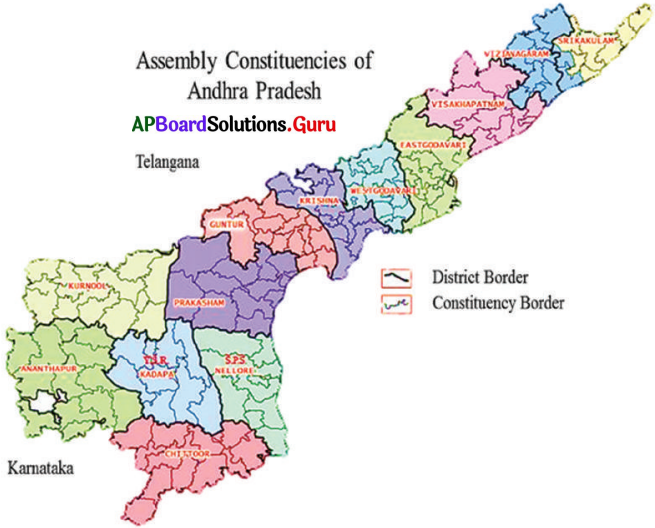
| District | Constituencies |
| 1. Srikakulam | 10 |
| 2. Vizianagaram | 9 |
| 3. Visakhapatnam | 15 |
| 4. East Godavari | 19 |
| 5. West Godavari | 15 |
| 6. Krishna | 16 |
| 7. Guntur | 17 |
| 8. Prakasam | 12 |
| 9. Nellore | 10 |
| 10. Kadapa | 10 |
| 11. Kurnool | 14 |
| 12. Anantapur | 14 |
| 13. Chittoor | 14 |
| Total | 175 |
Question 11.
Appreciate the role of the District Collector in the development of a district.
Answer:
The District Collector is the head of the district administration. He/She is selected through UPSC, and allotted to states, by the Central Government. He has to take responsibility of various departments like Revenue (The Collector handles all matters connected to land records and Revenue Administration.), law & order (to maintain Law and Order to maintain Social harmony), local self-government, agriculture, disaster management (To take immediate actions at the time of disasters and prevent or minimize the damage) and Election Officer (To ensure the conduct of elections), etc. He is the First-class Magistrate at district Level.
Question 12.
Why is it necessary to elect a representative? Discuss.
Answer:
Now-a-days most of the countries followed democracy.
Due to vast areas and more population each and every country adopted representative democracy, means indirect democracy.
In this part instead of people, people’s representatives participated in law making, interact with constituents and decisions are taken by representives only.
So to elect the representatives is necessary.
II. Choose the correct answer.
1. The word State Government refers to
A) Government Departments in the States
B) Legislative Assembly
C) Legislative Council
D) All of the above
Answer:
D) All of the above
2. How many states are there in India?
A) 29
B) 28
C) 27
D) 26
Answer:
B) 28
3. The real powers in administration in the state government are exercised by
A) Speaker
B) Governor
C) Chief Minister
D) All of the above
Answer:
C) Chief Minister
4. Who becomes the Chief Minister?
A) Leader of the Opposition Party
B) Leader of the Majority Party
C) Member of Legislative Assembly
D) Speaker
Answer:
B) Leader of the Majority Party
III. Match the following.
| Group-A | Group-B |
| 1. Chief Minister | i) Legislative Assembly |
| 2. Governor | ii) Legislative Council |
| 3. M.L.A | iii) Head of the state |
| 4. M.L.C | iv) Head of the Govt. |
| 5. Collector | v) District Magistrate |
Answer:
| Group-A | Group-B |
| 1. Chief Minister | iv) Head of the Govt. |
| 2. Governor | iii) Head of the state |
| 3. M.L.A | i) Legislative Assembly |
| 4. M.L.C | ii) Legislative Council |
| 5. Collector | v) District Magistrate |
IV. 1. Segregate the following in suitable heading.
Speaker, Judge, Min ister, Member of Legislative Assembly, Lawyer, Chief justice,
| Judiciary | Legislature |
Answer:
| Judiciary | Legislature |
| 1. Chief justice | 1. Member of Legislative Assembly (MLA) |
| 2. Judge | 2. Speaker |
| 3. Lawyer | 3. Minister |
IV. 2.Fill the labile with correct words given. (AS – 3)
(175 members, MLA, Speaker, 58 members, 5 years, MLC, 6 years,Chairman)
| Item | Legislative Assembly | Legislative Council |
| Term | ||
| No. of Members | ||
| Presides th e House | ||
| People representative |
Answer:
| Item | Legislative Assembly | Legislative Council |
| Term | 5 years | 6 years |
| No. of Members | 175 | 58 |
| Presides th e House | Speaker | Chair Person |
| People representative | M.L.A. | M.L.C. |
7th Class Social 10th Lesson State Government InText Questions and Answers
7th Class Social Textbook Page No. 44
Question 1.
Make of a list of Governors of Andhra Pradesh, who has served so far.
Answer:

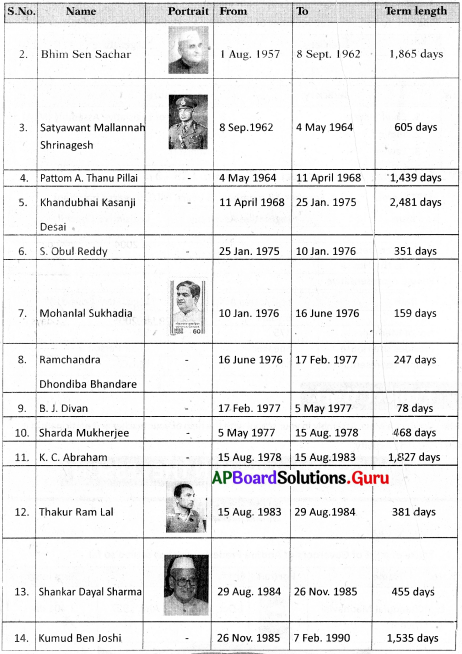
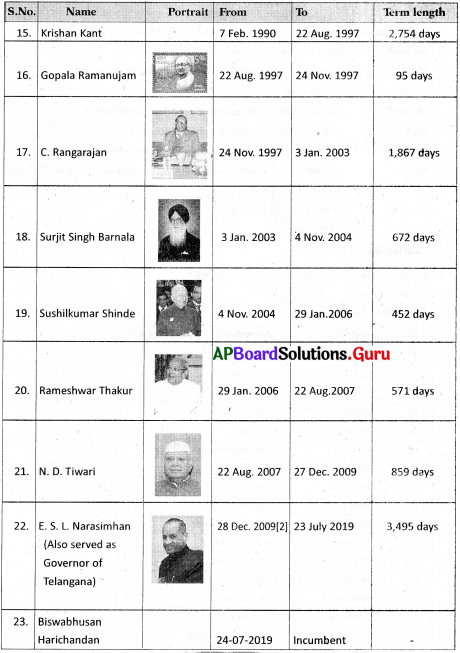
7th Class Social Textbook Page No. 45
Question 2.
Take an interview with your Constituency Member of Legislative Assembly.
Answer:
Student : Good Morning Sir. How are you Sir?
MLA : Good morning my dear student. 1 am fine. How are you?
Student : I am fine Sir.
Student : Sir, I am here to address some problems in my school.
MLA : What problems do you face in your school?
Student : Sir, there is no library and laboratory in my school.
MLA : Oh! Within two months I will speak with government and I will arrange both in your school.
Student : Thank you very much sir.
MLA : Welcome
7th Class Social Textbook Page No. 46
Question 3.
List out Assembly Constituencies in your District.
Answer:
EX : Krishna District.
| District | Assembly Constituencies |
| Krishna | Nuzvid |
| Krishna | Kaikalur |
| Krishna | Gannavaram |
| Krishna | Penamaluru |
| Krishna | Pedana |
| Krishna | Machilipatnam |
| Krishna | Avanigadda |
| Krishna | Pamarru (SC) . |
| Krishna | Gudivada |
| Krishna | Vijayawada East |
| Krishna | Nandigama (SC) |
| Krishna | Jaggayyapeta |
| Krishna | Vijayawada Central |
| Krishna | Mylavaram |
| Krishna | Tiruvuru (SC) |
| Krishna | Vijayawada West |
![]()
Question 4.
Examine the Voter ID Card of your parents and prepare an imaginary Voter ID Card for you with all the details.
Answer:
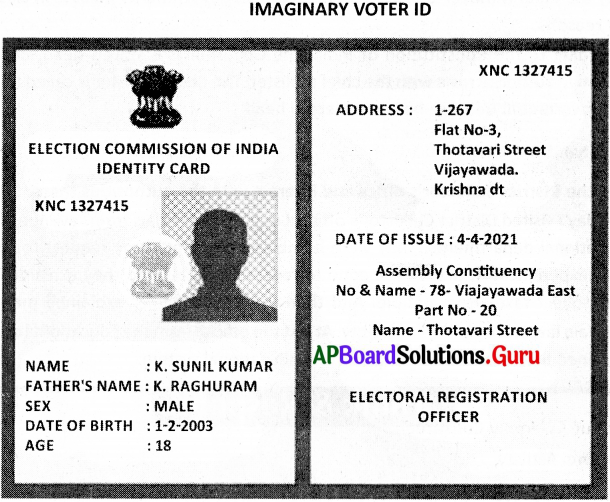
Note :
- More possession of this card is no guarantee. That you are elector in the current ele-ctoral roll. Please check your name in the current electoral roll before every election.
- Date of Birth mentioned in this card shall not be treated as a proof of age/ D.O.B for any purpose other than registration in electoral roll.
7th Class Social Textbook Page No. 48
Question 5.
Make a list of the Acts on Women safety.
Answer:
List of Acts :
- The Sexual Harassment of Women at Workplace (PREVENTION, PROHIBITION and REDRESSAL) Act, 2013
- The Immoral Traffic (Prevention) Act, 1956
- The Dowry Prohibition Act, 1961 (28 of 1961) (Amended in 1986)
- The Indecent Representation of Women (Prohibition) Act, 1986
- The Commission of Sati (Prevention) Act, 1987 (3 of 1988)
- Protection of Women from Domestic Violence Act, 2005
- The Criminal Law (Amendment) Act, 2013
7th Class Social Textbook Page No. 49
Question 6.
Why the Chief Minister is called real head of the Government? Discuss in class and list out reasons.
Answer:
According to the Constitution of India, the Governor is a state’s head, but de facto executive authority rests with the chief minister. The Chief Minister is called real head of the Government because he is the elected head.
7th Class Social Textbook Page No. 51
Question 7.
Visit the District Collector’s office and interact with the authorities there.
Answer:
One day I visited District Collector’s office. I met three officials from revenue, police and educational departments. They were humble and accepted my request to share their work experience. At first I have gone to revenue officials and they explained me how they collect taxes from people. And then the Police Officer explained me how they maintain law and order in the society. At last the official from the Educational department explained how they work to improve our educational system.
Think & Respond
7th Class Social Textbook Page No. 44
Question 1.
Who is the present Governor of our state?
Answer:
Biswabhusan Harichandan is the present Governor of our State (AP).
7th Class Social Textbook Page No. 45
Question 2.
If you to contest in elections in your assembly constituency, what would be your election manifesto?
Answer:
- I will promise to people to solve the problems of the constituency.
Ex : Water, electricity, removal of garbage, etc. - I will promise to the people to provide moral assistance when they are in problamatic situation.
- I will promise the people, I will try to avoid corruption from my constituency.
7th Class Social Textbook Page No. 47
Question 3.
What is the name of your Assembly Constituency?
Answer:
Ex : ……………………….. is the name of your Assembly Constituency.
7th Class Social Textbook Page No. 47
Question 4.
Who is the present MLA of your Assembly constituency?
Answer:
Ex : ……………………. is is the Present MLA of My Assembly constituency.
7th Class Social Textbook Page No. 48
Question 5.
What happens if any one of the houses do not approve a bill?
Answer:
The Parliament of Indiai is bicameral. Concurrence of both houses are required to pass any bill. However, the framers of the Constitution of India anticipated situations of deadlock between the Legislative Assembly and the Legislative Council. Therefore, the Constitution of India provides for Joint sittings of both the Houses to break the deadlock.
![]()
7th Class Social Textbook Page No. 49
Question 6.
If you get a chance to get. into a Ministry, which portfolio do you like most? What are the policies you will implement?
Answer:
I like Tourism ministry. I implement tour visits to the middle class and lower class people by giving them concessions.
Explore
7th Class Social Textbook Page No. 43
Question 1.
Learn more about the federal system, with the. help of your teacher.
Answer:
Federal System:
- Federal system is a system based upon democratic rules and institutions in which the power to govern is shared between central and state governments.
- This system gives definite powers to both central and state governments.
- According to this system our constitution divided the administrative powers into three lists.
- They are (i) The Union list, (ii) The State list and (iii) The Concurrent list.
7th Class Social Textbook Page No. 46
Question 2.
Learn more about secret voting system.
Answer:
- The most basic form of a secret ballot utilizes blank pieces.of paper upon which each voter marks his or her choice.
- Without revealing the votes to ainyone, the voter folds the ballot paper in half and places it in a sealed box.
- This box is later emptied for counting.
7th Class Social Textbook Page No. 47
Question 3.
Know about the number of members of Andhra Pradesh Legislative Council.
Answer:
There are 58 members in AP Legislative Council.
7th Class Social Textbook Page NO. 51
Question 4.
Know more about the magisterial powers of District Collector.
Answer:
As District Magistrate :
- Conducts criminal court of executive magistrate.
- Maintenance of law and order.
- Coordinates of the police.
- Supervision of subordinate executive magistracy and conduct magisterial inquiries.
- Hearing cases under the preventive section of the Criminal Procedure Code.
- Supervision of jails, and certification of execution of capital sentences.
- inspection of police stations, prisons, and juvenile homes in the district.
- Authorising parole orders to inmates.
- Granting arms and ammunition licence under Arms Act.
- Prepares panel of names for appointment of public prosecutors and additional public prosecutors with consultation with session judge in district.
- Disaster management during natural calamities such as floods, famines or epidemics.
- Crisis management during riots or external aggression.
- Child Labour/bonded labour related matters.
![]()
Project Work
Conduct: a Mock Assembly in your school with the help of your teacher and participate in it.
Answer: